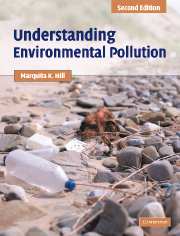Book contents
- Frontmatter
- Contents
- Preface
- Acknowledgements
- List of abbreviations and acronyms
- Chapter 1 Understanding pollution
- Chapter 2 Reducing pollution
- Chapter 3 Chemical toxicity
- Chapter 4 Chemical exposures and risk assessment
- Chapter 5 Air pollution
- Chapter 6 Acidic deposition
- Chapter 7 Global climate change
- Chapter 8 Stratospheric-ozone depletion
- Chapter 9 Water pollution
- Chapter 10 Drinking-water pollution
- Chapter 11 Solid waste
- Chapter 12 Hazardous waste
- Chapter 13 Energy
- Chapter 14 Persistent, bioaccumulative, and toxic
- Chapter 15 Metals
- Chapter 16 Pesticides
- Chapter 17 Pollution at home
- Chapter 18 Zero waste, zero emissions
- Index
- References
Chapter 7 - Global climate change
- Frontmatter
- Contents
- Preface
- Acknowledgements
- List of abbreviations and acronyms
- Chapter 1 Understanding pollution
- Chapter 2 Reducing pollution
- Chapter 3 Chemical toxicity
- Chapter 4 Chemical exposures and risk assessment
- Chapter 5 Air pollution
- Chapter 6 Acidic deposition
- Chapter 7 Global climate change
- Chapter 8 Stratospheric-ozone depletion
- Chapter 9 Water pollution
- Chapter 10 Drinking-water pollution
- Chapter 11 Solid waste
- Chapter 12 Hazardous waste
- Chapter 13 Energy
- Chapter 14 Persistent, bioaccumulative, and toxic
- Chapter 15 Metals
- Chapter 16 Pesticides
- Chapter 17 Pollution at home
- Chapter 18 Zero waste, zero emissions
- Index
- References
Summary
‘We are undertaking a vast experiment with Earth's climate. We're not doing it to test a hypothesis … We're doing it because we can't help it. But since we are doing it, we can at least start behaving like good experimenters.’
Donald Kennedy, Science Editor-in-ChiefClimate change is nothing new. About 18 000 years ago, Earth was experiencing the last of many ice ages, from which it only emerged about 10 000 years ago. More recently, between the years 1430 and 1850, portions of the Earth passed through a little ice age. The role of greenhouse gases, especially carbon dioxide and water vapor, in warming the Earth is also ancient, and indeed has long served life on Earth well. Figure 7.1 shows a representation of this phenomenon. Radiation from the sun reaches and warms the Earth's surface. In turn, Earth emits radiant heat (infrared radiation) back toward space; part of this radiant heat is captured by water vapor and greenhouse gases. Without this so-called “greenhouse effect” to trap the warmth, the Earth could be 35 °C colder than it actually is, and would not support life. However, the twentieth century has brought greater warming beyond that just described. It is this accelerated warming that we examine in this chapter.
Section I notes that Earth has warmed over the twentieth century. It looks at increased levels of greenhouse gases believed to be responsible for the warming, and examines observations that are consistent with warming including increasing ocean temperature, melting snow and ice, and rising sea levels. Section II summarizes how global climate change is assessed using general circulation models. It looks too at the conclusion of the Intergovernmental Panel on Climate Change that the warming is due to human actions.
- Type
- Chapter
- Information
- Understanding Environmental PollutionA Primer, pp. 154 - 180Publisher: Cambridge University PressPrint publication year: 2004



